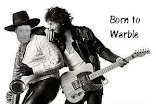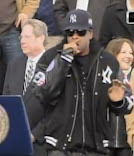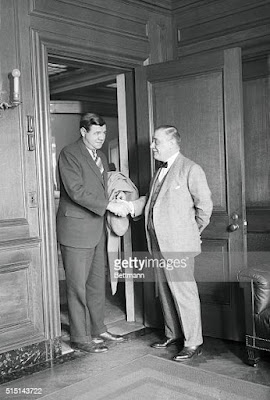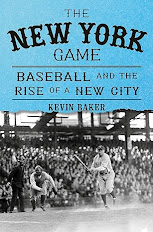Last time out, in our ongoing "celebration" of The Intern's 25th year at the helm, we compared his record to those of a couple of legendary, long-serving Yankees GMs.
So who IS the greatest baseball executive in New York Yankees' history? Is it indeed our darling Brian? "Cousin Edgar" Barrow? George Weiss?
It is...Jacob Ruppert, of course!
The Colonel (it was a title bestowed from his mostly honorary work with the New York State national guard) came up the less-than-hard way. Grandson of a German immigrant who started a very successful beer brewing company, Ruppert grew up in this Fifth Avenue mansion:
No, it's not Dracula's castle—though its location, up on Fifth near 93rd Street—was a lot different then (1884) than what it soon would look like.
(See below—the Ruppert mansion facing east).
Never a sentimental type, Rude sold the old pile for a fortune in 1924, after his mother died. That was the Colonel to the core: always with an eye on the main chance, no matter what it took.
Accepted into Columbia, he went directly into the family business instead—starting as a barrel washer, to learn it from the bottom up. Booming though the business was, he expanded it vastly, and then diversified, investing in the garment trade and real estate—among other things.
In his 30's, he served 8 years in Congress as an ornament of Tammany Hall. In return for giving a respectable shine to the political machine, he secured much of the beer distribution to an organization based in countless saloons.
The mind reels over how different our horsehide history might have been had he done so. But the Colonel—an inveterate New Yorker—scoffed that Chicago was "too far from Broadway."
Instead, he teamed up with another colonel, the immortal Tillinghast l'Hommedieu Huston, to buy a floundering, American-League franchise that didn't even have its own ballpark. The cost: all of $480,000, or around $13 million today.
It was Ruppert who turned that team—previously noted for its bad luck—into a juggernaut.
First, by signing the greatest sports star in the nation to come play for the Yankees, then by building the Famous Original Yankee Stadium, at the time the largest baseball stadium in the world and a tourist attraction in its own right.Built, mind you, in less than a year and for $2.5 million—without so much as a dime coming from the public coffers.
Despite his adorable German accent, Ruppert was a cold-eyed bastard. He never married, but collected mistresses as he did real estate, factories, jade, objets d'art, and yachts.
When he wanted to hire Miller Huggins as manager, his fellow colonel objected. Ruppert waited until Huston went to France during World War I—then hired Huggins anyway. When Huston came back, Ruppert pushed him out of the partnership.
When Ban Johnson failed to see to it that the Colonel could buy the stars he wanted to—then objected to him stripping the Red Sox of their best players—Ruppert utzed him out of the presidency of the league Johnson had founded.
He really was a big fan—when the Yanks were looking to pull out the final game of the 1923 World Series, he promised the bullpen that he would give them his entire business if they just preserved the win, much to their amusement. (The Yankees won. Ruppert did not hand over the biz.)
But when players dared to defy him—as Joe DiMaggio did in a 1938 holdout, Ruppert dealt with them harshly. He even cut Babe Ruth's salary near the end of his career.
When the Giants tried to boot the Yankees out of New York altogether, Ruppert relied on his Tammany connections to secure the location for his new ballpark.
"Moving to the Bronx was a mistake," he liked to say. "But it was the Giants' mistake, not mine."
When his original business was deep-sixed by Prohibition—unlike that of a certain, later Yankees owner who managed to wreck a profitable family business all on his own—Ruppert simply invested more in his ballclub and other enterprises.
Soon, the Yankees were breaking all attendance records—and earning a steady stream of income from other events at their big new cathedral in the Bronx. But Jacob Ruppert was a businessman, not just an impresario.
It was Ruppert who hired Barrow and Weiss, Ruppert who turned the Yankees from a sensation into a 45-year dynasty. Ruppert who put in place the personnel who built the system that went on churning out champions for an incredible quarter-century after his death in 1939.
No other team owner in North America—save for Branch Rickey—has done anything like that. And he accomplished it all without the biggest advantage a New York team has in the present day, which is its television market.
It's just too bad that the Colonel didn't have a kid to pass the team on to. Or maybe, judging by present results, it's just as well that he didn't.














































8 comments:
Well written. Thank you
Sure thing!
I always appreciate the historical perspective you bring to the table, Horace. Long may you live!
I bet The Colonel wanted to win badly enough to crack skulls and get the opposing pitchers blind drunk the nights before they started.
Miller Huggins, a very wise man, is reported as once having said, "You tell a ballplayer the same thing a hundred times, and then you tell him again, because maybe that'll be the time he gets it."
HC, thanks for the history lesson! OK, so which of the aforementioned gentlemen was your uncle? 🤔
Thanks, guys! And none were my uncle, alas!
As for that accent, well, it was a lot more adorable before WW II. With Ruppert, it made him sound like some kindly, eccentric gent. Which he certainly was not. I wonder if he kept it for camouflage. Guys like that, you never see them coming.
Welcome back, A. Bosch! And Winnie, that's a great Miller Huggins quote. Huggins was a lawyer, and a very smart guy. Unfortunately, he got it into his head over the 1928-29 offseason that the secret to health was getting lots of sun, or the closest approximation thereof. He started spending a lot of time in a solarium, developed a strange black mole on his face, went into the hospital...and was dead before the end of the season.
Hmm, maybe it WASN'T the key to health...
Great post...my wife and I recently watched "The Gilded Age" which was based on the wealthy folks in NYC in the late 1800s. It's not totally accurate from a historical point of view, but there's enough truth in it to give a cliff notes perspective of that time period which coincides with your post...
Post a Comment